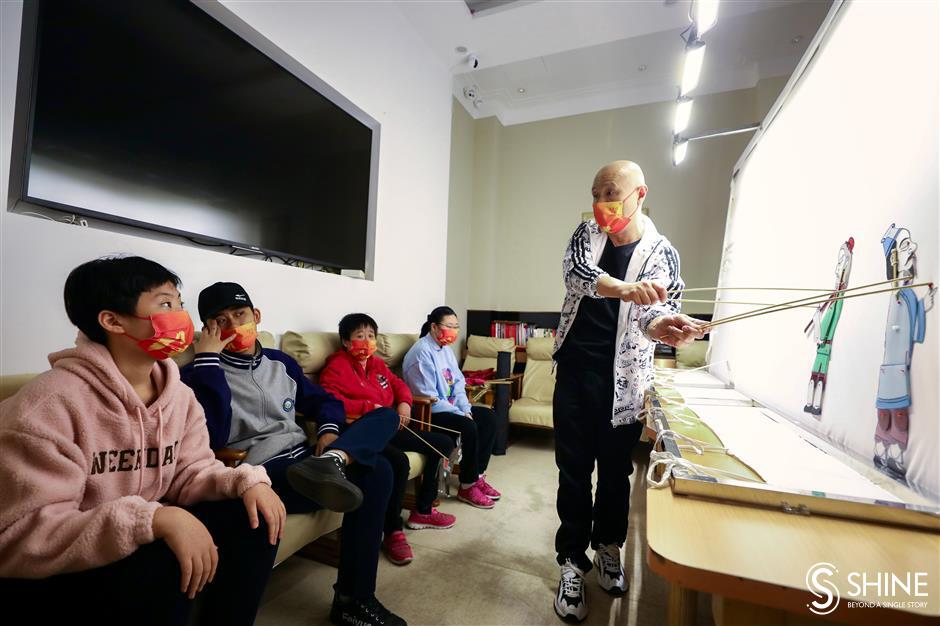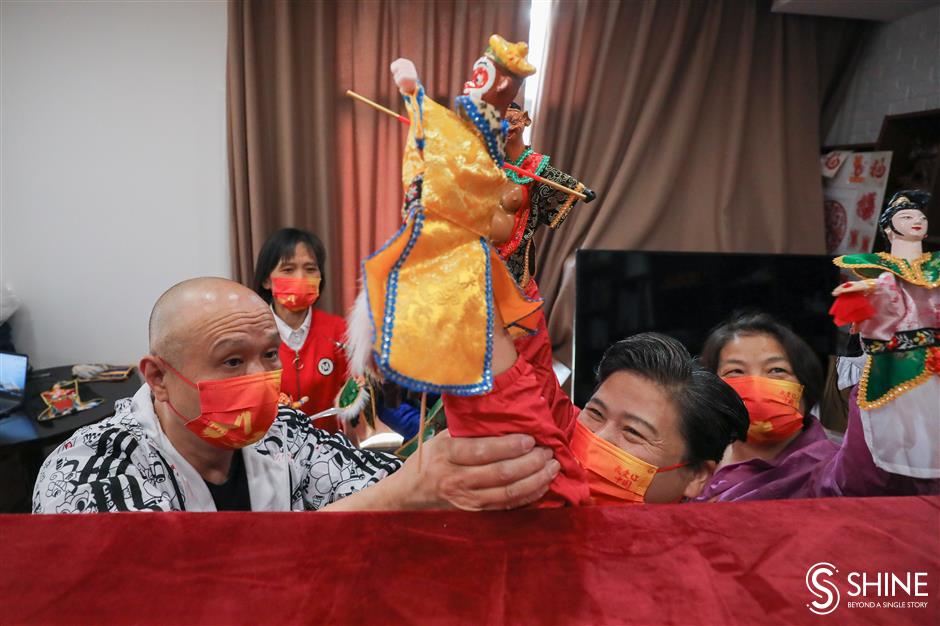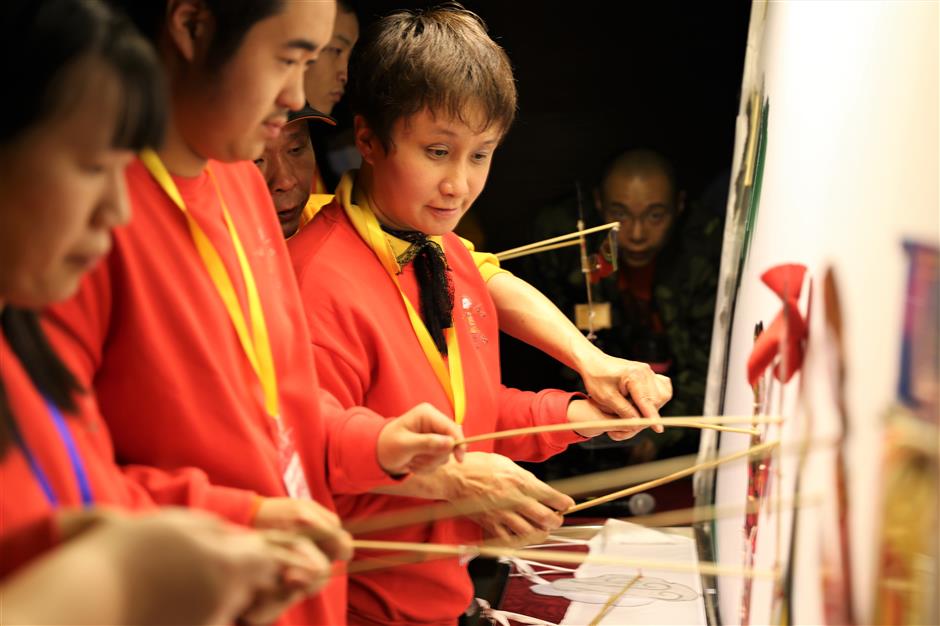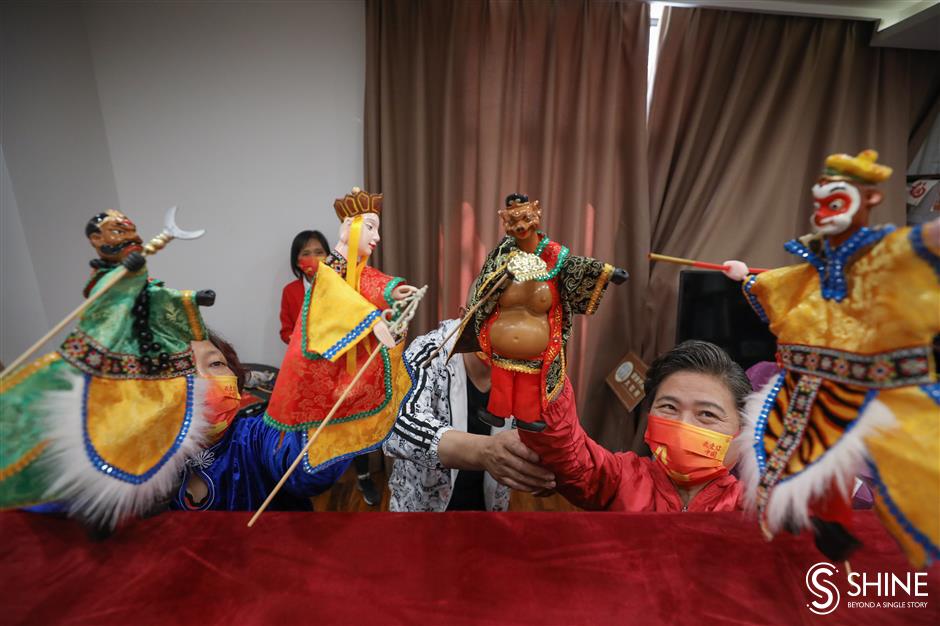Government News
Ancient folk art leads the mentally handicapped out of the shadows 2022-10-24
An ancient Chinese form of storytelling is helping to bring autistic children out of the shadows and helping seniors avoid the onset of Alzheimer's.
Chinese traditional shadow puppetry, or piyingxi, is being used as therapy at the Shanghai Xinqing Community Service Center. More than 200 mentally handicapped children and seniors at risk of cognitive disabilities have benefited from the program.
Three years ago, Yao Yao was a girl with autism who didn't speak a word or respond to others. Then Lu Weidong, a social worker and art instructor at the center, introduced her to shadow puppetry.
He recalled how Yao Yao carefully opened the props box and touched the puppets with joy in her eyes.
Now 13, she is part of a special puppetry troupe for mentally handicapped children and has begun speaking and responding to others with simple words.

Lu Weidong instructs autistic children how to play Chinese traditional shadow puppetry.
Shadow puppetry originated more than 2,000 years ago in China. The traditional entertainment features flat, cut-out figures held between a light source and translucent screen. A skilled puppeteer can make the figures appear to walk, dance, fight and laugh.
The art form has survived the test of time and is now being adapted into modern therapy.
"I like shadow play," Yao Yao said. "It's amazing. We have a lot of fun."
Lu recalls an earlier era when traditional folk arts like shadow puppetry were prevalent on city streets.
"But now many children learn about them only from exhibits at museums," he said. "But these arts have hidden values yet to be discovered and can yield new surprises."
Yao Yao's story is not the exception. Through regular public performances and cultural exchange events, many handicapped children have found self-confidence by participating in the puppetry troupe.
Autism is a developmental disorder that disrupts a person's ability to interact and communicate with others. It is estimated that there are more than 10 million people with autism in China -- 2 million of them children.

Lu Weidong instructs the elderly to play hand puppetry.
In addition to shadow play, the Xinqing Community Service Center near Nanjing Road E. also offers hand puppetry classes for seniors to improve their brain power and try to avoid Alzheimer's, a disease that slowly erodes the memory and thought processes. The National Health Commission said recently that over 10 million Chinese people above 60 years old are suffering from the affliction.
Lu and other social workers at the center are excited by the results of using traditional arts as therapy. Puppetry, in particular, is well adapted because it involves precise movements of arms and fingers, and high levels of concentration.
Yao Yao is proud to be able to manipulate two puppet characters at the same time in performing the tale of "Mr. Dongguo and the Wolf" – her favorite shadow play.
"At the very beginning, she was afraid to make eye contact with us," said Lu. "Step by step, shadow puppetry aroused her curiosity and opened her heart to the world outside."
The former primary schoolteacher said autistic children desperately need recognition, care and respect.
He honed his own puppetry skills under the mentorship of Chinese masters of the art in Minhang District and in the city of Zhangzhou in Fujian Province.

Autistic children perform at the Shanghai Culture Square.
The children he helps are studying at the government-funded Sunshine Home, a daycare center for the mentally handicapped. They come to the center for shadow play lessons, where Lu has choreographed ancient Chinese legends and tales from classics like "Journey to the West" and "Water Margin" into shadow plays.
Photos of the children performing have been compiled into calendars used as souvenirs to mark their progress.
The center conducts health assessments of the children before and after each performance.
"The art lessons and performances are part of the rehabilitation process," Wu Jiaxin, the center's psychologist, told Shanghai Daily. "Autistic and mentally handicapped children who used to have poor concentration, comprehension and stiff movements have shown great improvement through these classes. They learn to communicate and work as a team."
The hand puppetry program for seniors, he said, requires a lot of precise finger movements that can stimulate the brain and ease the effects of Alzheimer's.

The elderly have fun during the performance.
Elderly participants Wei Aidi, Huang Fengjuan, Feng Zhu and Tang Saiyue recently joined forces for a public performance of the classic story "Monkey Subdues the White-Skeleton Demon," using hand puppets.
The women said they are grateful for the center's program, which has enriched their lives.
"The class is great practice to improve our powers of concentration," said Huang. "Each of us needs to remember our part in the play. It's so much fun. The whole process of teamwork brings us joy and fulfillment."
Shanghai's government and certain businesses have pledged their support for helping disadvantaged people.
For example, young people with mental disabilities are eligible for vocational training under a program launched by Shanghai Daily, in collaboration with coffee shops and multinational corporations. The project aims to provide a pathway for them to enter the workforce.
According to Ye Wenjun, deputy director of the center, programs to help those with mental problems are attracting notice from other communities, which may adopt similar activities.
Application Status
| 04-16 | 21315227 | Processing |
| 03-12 | 21315226 | Processing |
| 09-26 | 21315225 | Processing |
Inquiry Status
| 02-29 | 02131558 | Received |
| 03-06 | 02131557 | Received |
| 11-14 | 02131556 | Received |
FAQ
Q: Q: Is there a place where I can get...
A: A: Log on to http://touch.shio.gov....
A: A: Log on to http://touch.shio.gov....
Q: Q: What is the easiest way to set u...
A: A: 1. Log on to http://touch.shio.g...
A: A: 1. Log on to http://touch.shio.g...
Q: Where can I get an English map of S...
A: English maps of Shanghai are availa...
A: English maps of Shanghai are availa...

